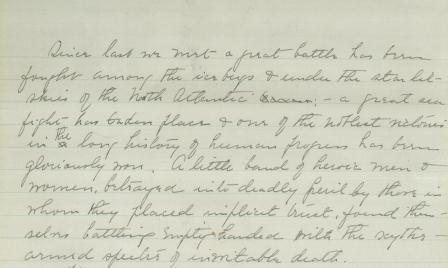By Emilie Haertsch
“Since last we met a great battle has been fought among the icebergs and under the star-filled skies of the North Atlantic.” These words began Rev. Edward Cummings sermon at Boston’s South Congregational Church just one week after the sinking of the RMS Titanic on April 15, 1912. Over 1,500 people died on the Titanic – one of the worst peacetime death tolls from a sea wreck. Edward Everett Hale, the minister emeritus at South Congregational Church, admired this sermon, and the Society has his 20-page handwritten copy of it in its collection.

Often remembered today as the father of poet E. E. Cummings, Edward Cummings was famous in his own right in his day. His first career was as a professor of sociology at Harvard University, but his second, as a minister, began when Hale recruited Cummings to preach at South Congregational. Cummings became a prominent Unitarian minister and was active in many social causes, including the World Peace Foundation, the Russian Famine Relief Committee, Hale House Settlement, the Massachusetts Civic League, and the Massachusetts Prison Association.
The tragedy of the Titanic affected Cummings deeply. His language betrays a feeling that this, too, was a matter of social justice. In his sermon on April 21, 1912, he said of the passengers, “A little band of heroic men and women, betrayed into deadly peril by those in whom they placed implicit trust, found themselves battling empty-handed with the scythe-armed specter of inimitable death.”
News of the Titanic’s end spread quickly and the resulting public shock and outrage created political fallout. Another prominent figure, the historian Henry Adams, wrote in a letter to Elizabeth Cameron on April 16, 1912, “In half an hour, just in a summer sea, were wrecked the Titanic; President Taft; the Republican party, Boyce Penrose, and I. We all foundered and disappeared. Old and sinful as I am, I turn green and sick when I think of it.” At the time, the laws regulating sea travel and concerning ship safety were lax – one of the reasons, perhaps, why there were only 20 lifeboats on board the Titanic. In the aftermath of the Titanic’s sinking, Sen. William Auden Smith from Michigan launched an investigation that led to the passage of a law creating tighter regulation of maritime travel.

